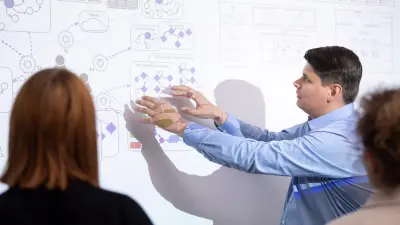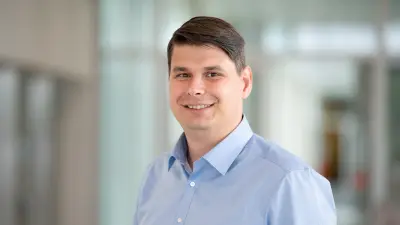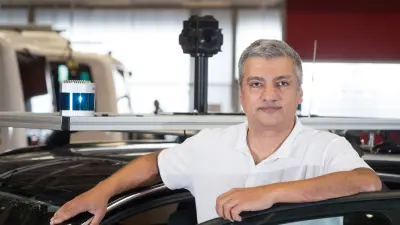Evgeny Kharlamov
Senior expert in AI methods for semantic digital twins and knowledge graphs

Making manufacturing smarter with the help of AI, digital twins, and semantic technologies is my passion. I have been with Bosch Research since 2018. My work aims at developing AI methods that combine — via symbolic reasoning and machine learning — manufacturing knowledge captured as semantic conceptual models, digital twins, and knowledge graphs with production data. Such methods allow us to enhance and democratize industrial data analytics and analyses, and develop industrial AI solutions such as semantically enhanced machine learning pipelines for monitoring discrete manufacturing operations. I aim for solutions that are based on solid theory and have high impact in Industry 4.0. I am active in international scientific and engineering communities. For example, I have more than 130 scientific publications and several of them were awarded with or nominated for the best paper award at top-tier venues. In 2021, I was ranked 18th among “AI 2000 Knowledge Engineering Most Influential Scholars” according to AMiner. Moreover, I participate in publicly funded projects with multiple academic and industrial partners and am currently running three projects of this sort at Bosch.
Please tell us what fascinates you most about research.
I am fascinated with solving open problems to make the world a better place to live.
What makes research done at Bosch so special?
Bosch has a unique AI-centered goal – by 2025, all Bosch products should either contain AI or have been developed or manufactured with its help. This, along with the fact that Bosch has more than 400 locations worldwide, many of which are factories, provide a unique opportunity for researchers fascinated with smart and AI-powered manufacturing. This opportunity can be found in creating AI-based manufacturing solutions, deploying, and evaluating them, and in making a real impact in manufacturing. Moreover, Bosch offers a unique infrastructure with everything researchers need to support their work. Note also that Bosch is a global provider of manufacturing solutions, so the impact we have in Bosch goes global with Bosch products.
What research topics are you currently working on at Bosch?
My main research work relates to AI-based methods with applications in automation and optimization of manufacturing processes. The methods I am developing combine symbolic representation and reasoning with machine learning. They make it possible to account for both production data and the manufacturing knowledge captured as semantic conceptual models, digital twins, and knowledge graphs. My current research topics range from fundamental aspects of graph neural networks to standardization of semantic digital twins and end-user-oriented tools to explore industrial data or to develop ML solutions using this data.
What are the biggest scientific challenges in your field of research?
The main scientific challenge in my area is the deep integration of symbolically represented domain knowledge that comes with logical reasoning and machine learning that comes with neural networks. Such integration will enable explainable and trustable AI-solutions that are vital for industry.
How do the results of your research become part of solutions “Invented for life”?
For Bosch, Industry 4.0 and smart manufacturing are at the heart of technology “Invented for life”, since they aim to achieve production with constantly decreasing errors, resource consumption, and CO₂ emissions.
Curriculum vitae
Since 2021
Senior expert in AI methods for semantic digital twins and knowledge graphs. Bosch Center for Artificial Intelligence, Renningen (Germany)
2018
Research Scientist. Bosch Center for Artificial Intelligence, Renningen (Germany)
2018
Associate Professor, Department of Informatics, University of Oslo (Norway)
2013
Senior Research Fellow, University of Oxford (UK)
2009 to 2012
Research Visits to Telecom Paris (France), INRIA Saclay (France), University of Oxford (UK), University of Edinburgh (UK)
2007
Ph.D. in Computer Science, Free University of Bozen-Bolzano (Italy)
2004
MSc in Computational Logics, double-degree between TU Dresden (Germany) and Free University of Bozen-Bolzano (Italy)
1999
BSc in Mechanics and Mathematics, Novosibirsk State University (Russia)

Selected publications

Xu Zou et al. (2021)
- KDD 2021: 2461-2471

Jialin Zhao et al. (2021)
- NeurIPS 2021

Baifan Zhou et al. (2021)
- J. Web Semant. Volume 71, November 2021

Wenzheng Feng et al. (2020)
- NeurIPS 2020
Get in touch with me
Evgeny Kharlamov
Senior expert in AI methods for semantic digital twins and knowledge graphs


